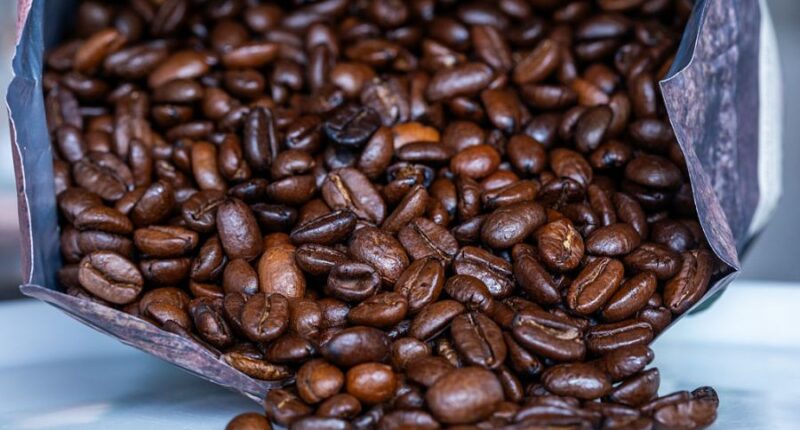Share this @internewscast.com
About half of all Americans report that the cost of groceries is a major stress factor in their lives, and the latest inflation data indicates that this pressure is not subsiding.
According to the Consumer Price Index, grocery prices increased by 0.6% from July to August, marking the sharpest one-month rise in nearly three years. They are now 2.7% higher than a year ago and have surged almost 30% since before the pandemic.
While grocery inflation has significantly cooled since it soared above 13% year-over-year in the summer of 2022, President Donald Trump’s tariffs and stricter immigration policies are complicating forecasts.
Although Trump’s trade policies have not increased consumer prices to the extent that many economists anticipated, certain items, like coffee, are beginning to experience notable price hikes.
In August, coffee prices jumped 3.6%, marking the largest monthly increase since 2011 and leaving them 20.9% higher than the previous year. Part of this rise can be attributed to recent droughts in Brazil and Vietnam, but Trump’s 50% tariff on Brazil, the leading coffee exporter, has contributed to the recent price spike.
The U.S. also depends heavily on imports and immigrant labor for its fresh produce. According to the CPI, tomato prices increased by 4.5% last month, lettuce by 3.5%, and bananas by 2.1%. Overall, fresh vegetable prices rose 3.0% in August, the largest monthly climb since 2020.
Limited cattle supply has continued to put upward pressure on beef prices, which are at record highs. Meanwhile, egg prices though down roughly 40% from their March peak remain up from a year ago amid lingering bird flu disruptions.
Coffee (+20.9%)
- Price Increase: +20.9% from Aug. 2024 to Aug. 2025
- Average Price: $8.87 per lb in Aug. 2025 (Coffee, 100%, ground roast)

Ground roast coffee prices in the U.S. hit a record $8.87 per pound in August, up from $6.31 a year earlier.
The surge has been fueled in part by volatile weather in Brazil and Vietnam, which has cut production forecasts in the world’s two largest coffee exporters.
Unlike most foods that can be produced domestically, the U.S. is almost entirely dependent on imports for its coffee supply.
At the same time, demand for coffee has remained strong and President Trump’s 50% tariff on Brazilian goods, including coffee, has added further upward pressure.
Brazilian coffee exports to the U.S. fell 26% from July to August, according to coffee exporters group Cecafe, which said tariffs weighed on performance.
Beef and veal (+13.9%)
- Price Increase: +13.9% from Aug. 2024 to Aug. 2025
- Average Price: $6.32 per lb in Aug. 2025 (100% ground beef)

The average price of ground beef hit a record $6.32 per pound last month, up more than 13% from a year earlier and nearly 60% higher than at the start of 2021, according to the CPI’s average price data.
At the core of the problem is supply and demand. U.S. cattle inventory is at its lowest level in nearly 75 years, according to the American Farm Bureau Federation. Yet Americans’ appetite for steaks and cheeseburgers has remained strong.
To meet that demand, the U.S. imported a record 4.6 billion pounds of beef in 2024, making it the world’s second-largest importer. Australia is the top supplier to the U.S., followed by Canada and Brazil. Trump’s tariffs on Brazilian beef could add pressure to global supply chains, potentially keeping U.S. beef prices elevated in the months ahead.
Adding to the strain, the emergence of a flesh-eating pest in Mexico prompted U.S. officials to halt cattle shipments from south of the border last year.
Eggs (+10.9%)
- Increase: +10.9% from Aug. 2024 to Aug. 2025
- Average Price: $3.59 per doz. (Grade A, large)

After peaking at $6.23 per dozen in March, egg prices dropped to $3.59 in August. Costs remain roughly 11% higher than a year ago but are finally moving in the right direction.
Average egg prices more than doubled from March 2024 to March 2025, a shell shock that was largely driven by a bird flu epidemic that wiped out tens of millions of egg-laying hens.
“Egg-flation” got so out of control that some started raising chickens in their own backyards, while others tried to illegally smuggle eggs into the U.S. from Mexico.
Bird flu outbreaks have since slowed, leading the CDC to end its emergency response in July.










